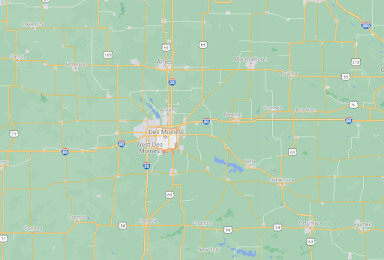Des Moines is the county seat of Polk County and also the capital of U.S. state of Iowa. Indians were the first people known to make their homes in the place where Des Moines now stands. They lived in villages of crude teepees or wickiups of bark, poles, skins, reeds, and rushes. Indian families spent most of their time providing for their needs.
The Polk County’s area recorded history began in 1673 when Father Jacques Marquette and Louis Joliet became the first Europeans to settle in Iowa.
One of the first white men to travel through the Des Moines River route was a French fur trader, Jean Faribault. He made several trips about 1800 up and down the river, trading for furs with the Sioux Indians.
In 1803, the area joined the United States as part of the Louisiana Purchase. In 1843, Fort Des Moines was constructed at the junction of the Des Moines and Raccoon Rivers and shortly thereafter, a general store and trading post opened.Although the Fort was abandoned in 1846, settlers occupied the site. Polk County, named after then President James K. Polk, was established in 1846, and in September 1851, Fort Des Moines is incorporated as a city.
Six years later Fort Des Moines was renamed Des Moines and it became the new state capital of Iowa.
In 1866, the first railroad was completed connecting Des Moines to Keokuk. In 1867 the first insurance company is organized. Drake University was established in 1881. In 1884 the first General Assembly session was held in the new capitol building.
Des Moines city of Iowa
The Marvel of Agar-Agar: A Natural Gelling Agent
-
Agar-agar, a substance prized globally, functions as an exceptionally
effective binding and gelling agent across numerous applications, from
culinary arts ...










